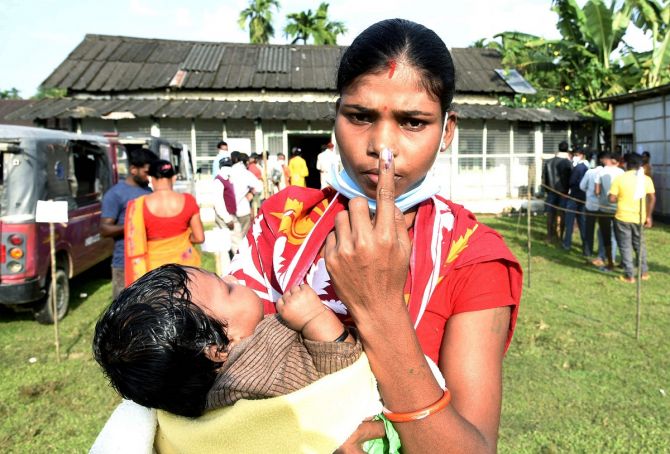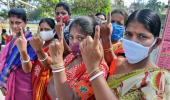With the assembly elections to five major state expected to be held soon, the current political situation is not so favourable for the BJP in any of these states, reports Aditi Phadnis.

Uttar Pradesh: Banking on infra boost
It’s the most eagerly awaited election. The question everyone is asking is whether the Bharatiya Janata Party will retain its 2017 tally, which was unmatched.
The state has been rocked by communal tension and agitation by farmers.
But it has also seen extensive infrastructure development in the past five years, including Metro services in the state capital Lucknow, highways and roads criss-crossing the state, and new airports.
COVID-19 took a very high toll on the state, especially during the second wave that spread rapidly in villages.
Although the Uttar Pradesh government has said on the floor of the assembly that not a single person died from lack of oxygen, the fact is that the second wave led to widespread death and destitution.
The challenge before the BJP is to retain its numbers, in the face of farmer resentment and aggressive mobilisation by the opposition parties, including the Samajwadi Party and the Congress, which is seeking to reinvent itself.
Goa: Rerun of BJP vs TMC?
Goa went through an unprecedented political roller-coaster ride in 2017 as Manohar Parrikar, delivered the state to the BJP -- a party that was not the single-largest after the assembly election but persuaded smaller parties to back it.
The Congress, in a way, snatched defeat from the jaws of victory. However, between then and now, with a devastating COVID-19 pandemic, the long illness and death of Manohar Parrikar, and the installation of Pramod Sawant as chief minister, the BJP has consolidated itself in the state.
The interesting thing about Goa is the small size of its constituencies and the narrow margins of victory and defeat. Goa is also prone to high levels of defections.
In this election, the Trinamool Congress will be making a debut and it is sparing no effort in its campaign.
The Catholic church is powerful in Goa and whether it will support the Congress or the TMC is not clear yet.
The Aam Aadmi Party is also a factor.
Uttarakhand: It’ll be tough for Dhami
For a small state, Uttarakhand has seen a lot of political upheavals.
Trivendra Singh Rawat became chief minister after the 2017 elections but in 2021, he was replaced with Tirath Singh Rawat, a Lok Sabha MP.
It was thought that he would become an MLA without much problem but he could not find an assembly member ready to give up his seat in the mandatory six-month period.
The state was also in the grips of the COVID-19 second wave and the Election Commission was reluctant to order elections.
He had to be replaced by Pushkar Singh Dhami within four months.
The second wave of COVID-19 is thought to have become especially virulent because of the Kumbh Mela, which was held in Haridwar, as people from all across India travelled to take a dip in the Ganga.
The Congress is a house divided in the state and the direct advantage of this will likely go to the BJP.
Punjab: A five-cornered contest
The state was led to victory by Amarinder Singh, who became chief minister of a Congress government.
In his tenure, Captain, as he is called, the Congress did not lose a single election.
However, the Congress leadership tried, first politely, then summarily, to replace him, effecting a leadership change.
This forced Captain to leave the Congress and form his own party, the Punjab Lok Congress, which will contest the elections in a pact with the BJP.
For the first time, the state will see a five-cornered contest.
The AAP, which has an organisational presence in the state, is contesting the elections seriously.
It is expected to gain from the divisions in the Congress.
Desecration of the Guru Granth Sahib, the holy book of the Sikhs, has been a recurring controversy that has now become a law and order issue for the government.
The election is wide open and could go any way.
Manipur: Personalities at work
The BJP has set a target to win 40-plus seats in the upcoming election.
In the 2017 elections, the Congress emerged as the single-largest party by winning 28 seats. But the BJP formed the government with the support of parties, such as the National People's Party, the Naga People's Front, and the Lok Janshakti Party.
More defections from the Congress and other parties followed.
The Congress’ strength has since been reduced to 17 legislators, while the BJP’s has gone up to 25.
The biggest issue in the election is restrictions on ‘outsiders’ via the Inner Line Permit.
Manipur became the fourth state in the Northeast, after Arunachal Pradesh, Nagaland, and Mizoram, to introduce the inner line permit. This is a way of protecting identity.
But personalities are at work as well.
The rise of Conrad Sangma represents another pole of power in politics in the Northeast, which has come to be dominated by Himanta Biswa Sarma, Assam chief minister.
Sangma could spoil the party for the BJP in the future.












 © 2025
© 2025